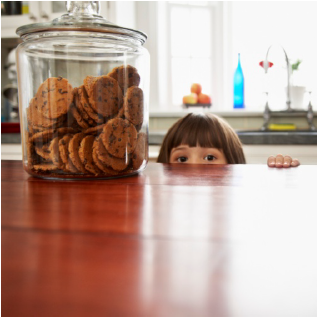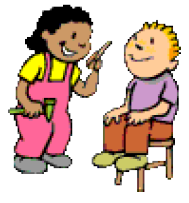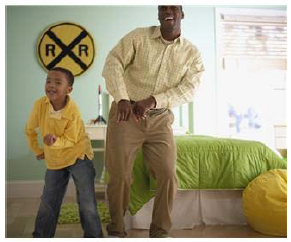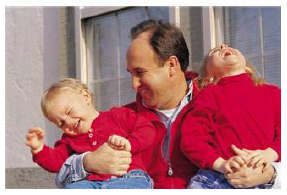What is Self Control?
- Self control is the ability to regulate our actions, thinking and emotions.
- One of the most important school readiness skills.
- Development of self control occurs over the first five years of life1.
- As early as infancy, babies begin to learn self control. For example, they suck their thumbs to calm down.

Ask yourself how children are doing!
- Is child able to wait for a turn?
- Is child following your directions?
- Is child good at focusing on one activity for a long period of time?
- Is child good at calming down when angry?
Why is Self Regulation Important?
- Preschool children with better self control skills are have more friends2.
- Preschoolers who are better at self control become more self-confident, more independent, better at handling stress and frustration, and better in academic performance during adolescence3.
Types of Self Control
- Impulse control - Child learns not to act on every impulse, such as grabbing a toy from someone else.
- Ability to plan and focus - Child can think ahead about actions or focus on an activity.
- Emotional control - Child can calm himself/ herself or regulate frustration or anger.
How to Help Young Children Learn Self Control
Pretend play
Encourage children’s pretend play and play with them. Encourage children to pretend to be teachers, construction workers, cooks, doctors or whatever they want. When children want to play restaurant, they role-play the cook, the servers, clients and the manager. You can provide any props like pencils and order pads, cooking utensils, pretend food and cash registers. Pretend play has been reported as a good way to teach self control skills such as impulse control, focusing on activity and emotional control because they get a chance to play other people’s roles4. Role-playing helps children take turns, follow the rules, set limits, share responsibility and understand how others feel.

Music
When children begin to get a little wild, try to sing a song together. When singing songs, ask children to take turns and ask children to perform certain actions (e.g., clapping, touching each body part, finger play and singing in different tempos) at different moments in the song. Songs such as “Hokey Pokey,” “Head, Shoulders, Knees and Toes,” “Itsy Bitsy Spider,” “BINGO,” “Ring Around the Rosie” and “Wheels on the Bus” are examples of developing children’s impulse-control.

Playing a game
Traditional games like “Red Light, Green Light,” “Simon Says,” “London Bridge” and “Freeze Tag” help develop children’s impulse control5 by asking them to listen to and follow instructions. “Simon Says,” for example, teaches children to follow what others say (e.g., Simon says sit down, Simon says stand on one leg, etc.). The winner is the person who follows whatever Simon says.

Routines
Have consistent daily routines (meal time, play time, story time, nap time, etc.). Children can learn what to do next if they follow those routines and this will help them improve their ability to plan ahead.

Teach emotions
Help children understand different kinds of emotions. Read children’s books about feelings (e.g., “When Sophie gets angry- really, really angry”, “How are you peeling?”, “The way I feel”, etc.). Help children learn words to describe their feelings (mad, happy, sad, proud, scared, loved, lonely and nervous), by labeling children’s feelings or talking about feelings with children. When children understand and label their own feelings, they can start regulating their anger or frustration. For example, when children can say they get angry because they can’t get what they want, they may act out less.

Parents and child care providers play a vital role in helping young children develop self control skills. Fortunately, young children’s everyday interactions with parents or child care providers offer abundant opportunities for developing self control skills.
References
1 McCabe, L. A., Cunnington, M., & Brooks-Gunn, J. (2004). The development of self-regulation in young children: Individual characteristics and environmental contexts. In R. F. Baumeister & K. D. Vohs (Eds. ), Handbook of Self-Regulation: Research, Theory and Applications (pp. 340 -356). New York: Guilford Publications, Inc.
2 Eisenberg, N., Fabes, R. A., Losoya, S. (1997). Emotional responding: Regulation, social correlates, and socialization. In P. Salovey and D. Sluyter (Eds.), Emotional Developmnt and emotional intelligence: Educational implications (pp. 129-16. New York: Basic Books.
3 Berk, L.E., Mann, T. D., & Ogan, A. T. (2006). Make-believe play: Wellspring for the development of self-regulation. In D.G. Singer, R. Colinkoff, & K. Hirsh-Kasek (Eds. ), Play=learning: How Play Motivates and Enhances Children’s Cognitive and Social-emotional Growth (pp. 74 -100). New York: Oxford University Press.
4 Elias, C. L., Eisenberg, N., & Berk, L. E. (2002). Self-regulation in young children: Is there a role for socio-dramatic play? Early Child Research Quarterly, 17, 216-238.
5 Riley, D., San Juan, R. R., Klinkner, J., & Ramminger, A., Burns, K., Carnas, M., Erickson, C., & Roach, M. (2008). Social & emotional development: Connecting science and practice in early childhood settings. St. Paul, MN: Redleaf Press.
Contact Yaebin Kim for more information - (702)-257-5521 or kimy@unce.unr.edu.
Kim, Y.
2011,
Young Children Who Learn Self Control Have More Chances for Success,
Extension | University of Nevada, Reno, Fact Sheet FS-11-57


